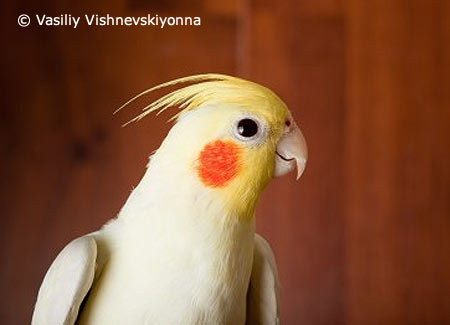Reasons Why Cockatiels Bite

Below are common reasons why a pet cockatiel may bite. Simply click on the biting topic below for more information. If you cannot determine why your cockatiel is biting with the information provided , please post your question on our parrot forum under the cockatiel section or head on over to our main cockatiel area.
- Reasons Why Cockatiels Bite
- Fearful Biting from a Cockatiel
- A Cockatiel Biting Out of Jealousy
- Cockatiel Territorial Biting
- Juvenile Biting in Cockatiels
- Reinforcement of Biting Unintentionally in Cockatiels
Juvenile Biting in Cockatiels
Some cockatiels may tend to slightly bite after they have just been weaned. This is a natural instinct and should be expected from most young birds. Most young cockatiels are testing out their beaks and are learning how to correctly use them—it’s much like a baby crawling before they learn how to walk. A young juvenile cockatiel will test its beak out on many objects as it is learning about its environment. Unfortunately, this means that some babies will test out their beaks on owners; thereby, giving off the notion of being an aggressive bird.
When the juvenile cockatiel sees the owner pull their hand back
because of an intended bite, it may continue to attempt to bite because
it enjoys the reaction it caused. Other pet cockatiels might perceive
this interaction as a means to control their owners when they don’t want
to be handled. Once a young juvenile has learned this most basic form on
communication, they will most likely try to manipulate their owner’s
actions by biting.
For example, many young cockatiels enjoy riding around on their owner's
shoulders and will bite if their owners reach for them. The cockatiel is
trying to comminute their dislike for this gesture. A young cockatiel
that reacts like this has not had the opportunity to learn the flock
dynamics (household rules) and needs to learn what is acceptable and
what is not.
Solution: Juvenile biting is common and the owner should completely
ignore all biting. It is important the bird understand that biting is
not an effective way to communicate with their owner. This is achieved
by not acknowledging the biting behavior. This means the owner should
never yell at the bird, tell him anything such as, “no bite,” flick the
bird’s break, spray him with water, wobble their hand showing
uneasiness, or make direct eye contact. Instead, the owner should go
about their business like nothing has happened. Eventually, the bird
will understand that biting will not alter the behavior of the owner and
the bird will realize that they can’t control the situation.
It should also be said that yelling at the bird, flicking its beak, or
spraying it with water are tactics that only create fright and thus
causes the birds to be fearful of humans. In fact, these types of
actions do not work in changing a bird’s behavior. Cockatiels do not
understand our human ways of punishment. This is only seen as an act of
aggression and will eventually lead to an aggressive and fearful adult
cockatiel.
Juvenile biting can also be encouraged accidently without the owner even
realizing it. Many young cockatiels love to nibble on their owner’s
hands or ears. Though this can be enjoyable for the owner, this should
be discouraged as this may lead to biting. If the cockatiel starts
nibbling, the owner should move the bird to a new position or distract
it.
If an owner uses the right behavioral tactics during this stage, biting
will eventually stop. This juvenile biting is only a phase and probably
developed as the baby needs to compete with other adults to survive. If
the owner has properly socialized the bird and ignored this type of
biting, the bird will most likely not use its beak in an aggressive
manner.




